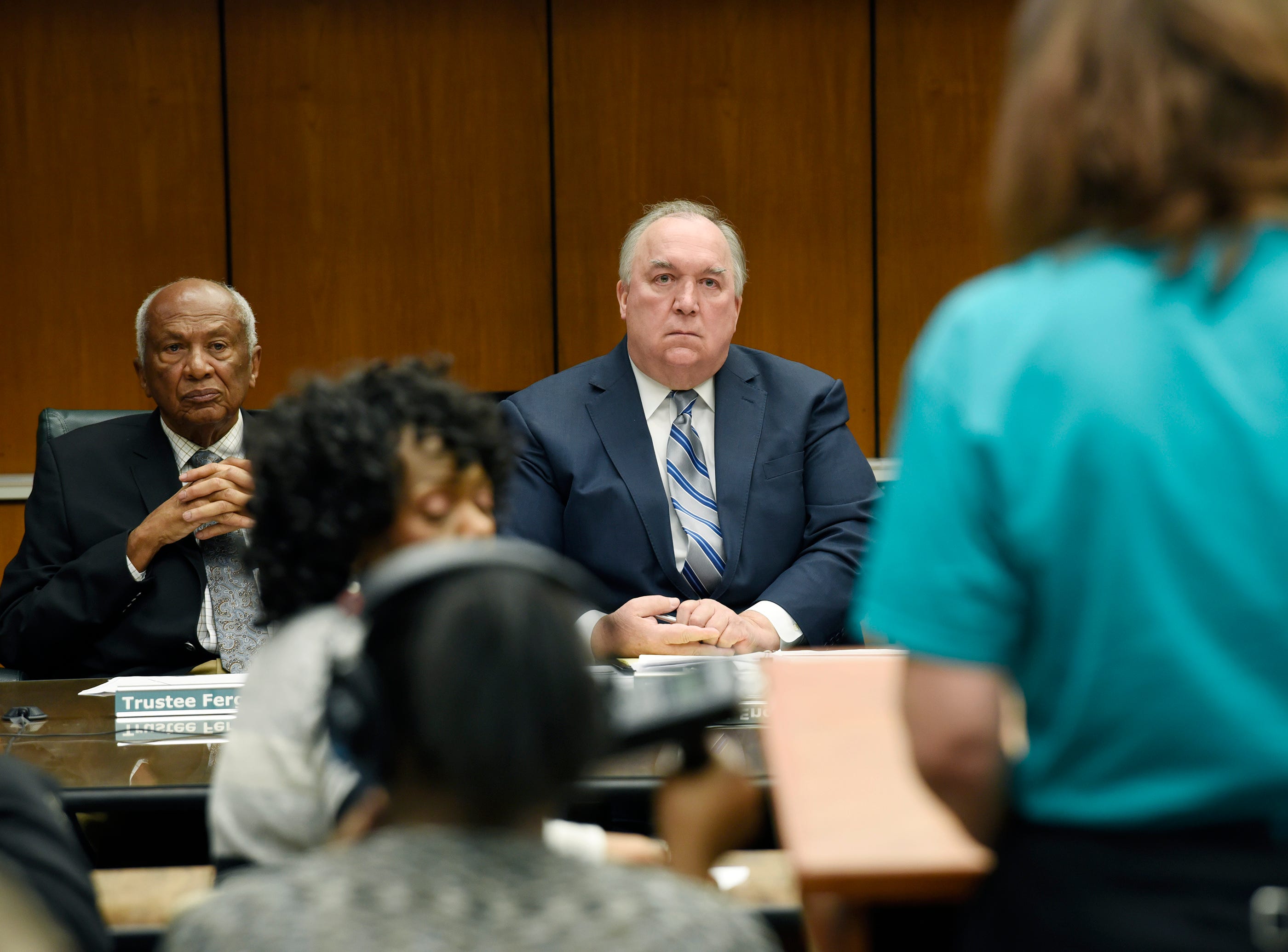MSU board OKs reopening Nassar victims fund
 Kim Kozlowski
Kim Kozlowski
East Lansing — Michigan State University's Board of Trustees on Wednesday directed the administration to resurrect a fund for counseling assistance for victims of serial pedophile Larry Nassar.
But the fund, which was once for victims and their family members, in the future will be only for "former patients" of Nassar, according to the resolution, which was approved unanimously.
Little discussion occurred before the board adopted the resolution other than interim President John Engler asking newly elected Chair Dianne Byrum to read the resolution since she was the primary author.
"This has been introduced by both Trustee (Brian) Mosallam and myself, and I would add that it has the support and the signatures of the entire board," Byrum said.
Without details, the opening of the fund can't be celebrated yet, said Valerie von Frank, mother of Grace French, a Nassar victim.
"Will it be a healing fund," von Frank asked, "or another PR move that simply helps the university try to burnish it tarnished reputation?"
The vote came as three new MSU trustees — Brianna Scott, Nancy Schlichting and Kelly Tebay — took their seats for the first time and the board elected Byrum as the new chair and Trustee Dan Kelley as vice chair for the next two years.
"We have a moral obligation to do what is right for the survivors and for their allies," Scott said.
Mosallam added he was happy the board voted unanimously to direct the administration to restart the fund.
"It is critical that we move forward on this," Mosallam said.
Morgan McCaul, who was abused by Nassar, offered to act as a consultant to the trustees in creating the new fund and said she would give up her right to get money from it.
"I want to help survivors, and I want to help MSU," McCaul said in a statement posted on the MSU Honor site. "We've all been hurt and now we can all start to heal.
"I am willing forfeit my use of the new fund in exchange for being able to act as a survivor consultant as the Board defines the new fund. I could help the Board of Trustees understand how to maximize the benefit of the funds they allocate by simply being on-call if the Board has questions. (I will donate my time.)"
Mosallam replied to McCaul on Twitter, thanking her.
"Thank you for your leadership on this," he said. "Please (direct message) us so we can organize a time for all of us to speak."
The $10 million fund, known as the Healing Assistance Fund, was approved by the board in December 2017 as victims and their allies were calling on MSU to do something in response to the growing number of women and girls who were reporting abuse by Nassar.
At the time, the scope of Nassar's damage was partially known but women were steadily coming forward, starting 15 months earlier when Rachael Denhollander first publicly accused Nassar of sexual abuse.
The fund was set up to help pay for her and other victims to get mental health services. But MSU froze the fund in July after paying out more than $1 million because of fraud the university said was related to someone who was neither a Nassar victim nor a victim's family member.
In December, the university announced it would roll the remaining $8.5 million into the historic $500 million settlement reached with victims last spring to reduce the amount the university would need to borrow.
Engler explained that the transfer would reduce the amount MSU has to borrow to pay for Nassar's crimes by $8.5 million and was one of several ways "MSU is accountable to those harmed." At a board meeting, he also indicated the settlement fund was 425 times the size of the remaining funds in the Healing Assistance Fund. But the move and his explanations angered victims and their families.
MSU spokeswoman Emily Guerrant said Wednesday that Engler "plans to work with the board on it. This is the direction they said they wanted to head, and he will work with them on it."
Engler has emphasized the university has made improvements reporting policies, health care practices, campus-wide sexual assault education and prevention efforts, as well as "trauma-informed responses and treatment for survivors."
At the time, Trustee Brian Breslin, who was then board chairman, said in a statement that the fund "was intended to be a bridge from the point of creation to when the survivors would receive payments from a settlement with the university."
The settlement funds — to be paid directly to victims per the decision of a third-party arbitrator — have not been distributed yet and are separate from the healing fund.
Before Wednesday's meeting, many were calling on the board to resurrect the fund.
"The sexual assault survivors deserve to know they have the counseling and support that was promised to them so that they can move forward and heal," tweeted U.S. Sen. Gary Peters, a Democrat from Bloomfield Township.
The move originally sparked a widespread outcry, with advocates saying the healing fund is critical so victims can get the counseling they need to heal and move on with their lives.
Larissa Boyce, who said she told former MSU head gymnastics coach Kathie Klages about Nassar in 1997, tweeted at the time: "Every time I think MSU leadership can’t get any worse, they somehow never cease to amaze me with their callus & heartless decisions."
Other trustees, led by Mosallam, slammed the decision to freeze the fund in a statement posted on Twitter signed by Byrum, Scott and Tebay.
Others at MSU said victims needed the fund, including Rebecca Campbell, a psychology professor and chair of the MSU Relationship Violence and Sexual Misconduct Workgroup appointed by Engler.
Campbell said then that the fund should be available to all victims, not only those who are part of the settlement.
In December, Kathy Haselmaier, a Michigan Technological University alumna who lives in Colorado, created an online appeal demanding that the fund be reopened.
Within hours, dozens, then hundreds of people signed, representing students, faculty, alumni and community members.
Among those who signed were Angela Povilaitis, who led the prosecutor of Nassar, Ingham County Judge Rosemarie Aquilina, former Gov. Jennifer Granholm and Denhollander. Groups such as MSU College Democrats and the activist group Reclaim MSU also signed.
Mosallam, Byrum, Tebay and Scott signed. Shortly after former Gov. Rick Snyder appointed Schlichting, she also signed, giving the trustees the five votes needed to resurrect the fund.
One of new Gov. Gretchen Whitmer's first actions last week was to sign the petition.
kkozlowski@detroitnews.com